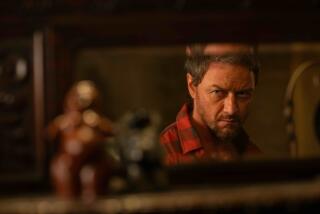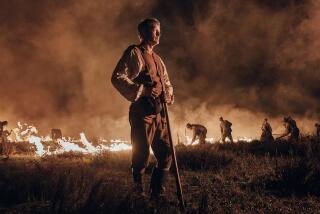Humor and Dignity Ease Pain of ‘Pelle’
- Share via
The Danish landscape in “Pelle the Conqueror” is forbidding, with its vast terrain iced hard by winter. But there are also welcoming patches, where the sun pushes through and settles on lush grass and wild strawberries.
That’s how Bille August’s fine film works as well. The 1988 release (screening Friday night as part of Golden West College’s foreign film series) is a clenched-fist adaptation of Martin Andersen Nexo’s 19th-Century novel about a Swedish father and son who immigrate to Denmark for a better life. Their story is so painful and unforgiving that it reads like Greek tragedy on the tundra. One critic said that if Charles Dickens were a Dane, this is the tale he’d have told.
Fortunately, August has a humanist’s heart. Even when Lasse (Max von Sydow, in one of his fullest performances) and his 11-year-old son, Pelle (Pelle Hvenegaard) suffer one injustice after another, there are respites of humor and rebellion to prevent the movie from becoming too much of a dirge.
Not many, mind you, but a few. August accomplishes something evocative by infusing his picture with a sense of dignity, if not triumph, where the human spirit makes a stand in the face of unrelenting heartache.
There isn’t much room for optimism, though. The first scene of this Oscar winner for best foreign-language film (it also won the top prize at Cannes) finds Lasse and Pelle aboard a ship encased in frigid fog as they make the trek to Denmark. Pelle asks his father about the life they can expect, and Lasse answers that their new country is a generous place of plenty, where the wages are so high that children never have to work and can “play all day.”
We soon learn how far from the truth that vision is and how impotent Lasse is to create a better world for himself and his son. A loving father, but also a worn-down alcoholic living on boasts, much of “Pelle the Conqueror’s” simple power comes from observing Pelle’s understanding his father’s weaknesses and growing from it.
Once embarking, the only work they find is on Stone Farm, owned by an indifferent, often cruel man (Alex Strobye) who has fathered illegitimate children throughout the province.
His mistreated wife (Astrid Strobye) wails so loudly at night that the laborers, really indentured servants, say she has a pact with the devil and “turns into a werewolf” after dusk.
Lasse and Pelle are given a bed in a dirty corner of the barn and put to work as stable hands. The hardships they encounter within this feudal system, from the sadistic ways of their overseers to the taunts Pelle endures at school for being a Swede, are the film’s dominant themes.
August, ever faithful to the novel, allows a few tiny victories, such as the joy Lasse and Pelle feel when the strawberries they’ve brought from home take root. There’s hope in this touching scene, just as there is when Pelle reveals his cleverness and spunk in many ways, especially at school; we understand his future will be better than his father’s.
Cinematographer Jorgen Persson (probably best know for “Elvira Madigan”) captures several memorable images of the starkly beautiful Danish terrain, but he also settles intimately on the faces of von Sydow and Hvenegaard.
Von Sydow’s face, with weariness and loss stamped on it, says everything. Next to Hvenegaard, whose intelligent eyes communicate a lifetime of possibilities, he looks like someone who has seen his future and knows there’s nothing in it.
What: Bille August’s “Pelle the Conqueror.”
When: Friday, March 12, at 7:30 p.m.
Where: Golden West College’s Forum II theater, 15744 Golden West St., Huntington Beach.
Whereabouts: Take the San Diego (I-405) Freeway to Golden West Street and head south.
Wherewithal: $3 and $3.50.
Where to call: (714) 891-3991.
More to Read
Only good movies
Get the Indie Focus newsletter, Mark Olsen's weekly guide to the world of cinema.
You may occasionally receive promotional content from the Los Angeles Times.










